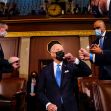The first group of white South African refugees admitted under a controversial Trump administration program landed at Washington Dulles International Airport on Monday, marking a significant departure from traditional U.S. refugee policy. The flight, operated by U.S.-funded Omni Air International, carried 49 Afrikaners, a white ethnic minority from South Africa, who received expedited refugee status. The administration claims the group faces racial persecution in South Africa, a claim that has sparked international controversy.
The program, introduced by executive order in February, provides a direct path to U.S. citizenship for white South Africans, significantly reducing the typical 18 to 24-month processing time for refugees to just three months. President Trump justified the policy shift by alleging that white farmers in South Africa are being subjected to widespread violence and land confiscation.
“Farmers are being killed,” Trump told reporters on Monday. “They happen to be white. Whether they are white or Black makes no difference to me. White farmers are being brutally killed, and the land is being confiscated in South Africa.”
However, South African officials have sharply disputed these claims. Police data from South Africa indicates that while there have been attacks on farms, the majority of victims have been Black farmworkers or former workers, not exclusively white farmers. From April 2020 to March 2024, 225 people were killed on farms, with only 53 identified as white farmers, according to the South African Police Service.
The South African government has strongly condemned the Trump administration’s refugee policy as politically motivated. Chrispin Phiri, a spokesman for South Africa’s foreign ministry, called the program “regrettable” and suggested it was intended to undermine South Africa’s constitutional democracy. He added that the resettlement program mischaracterizes the situation in South Africa as one of racial persecution, despite evidence to the contrary.
The dispute has further strained relations between Washington and Pretoria. In addition to the refugee policy, the Trump administration suspended all U.S. foreign aid to South Africa in February, citing the country’s land reform policies and its vocal criticism of Israel. The South African government’s Expropriation Act, which Trump referenced in his executive order, allows for land seizures without compensation under certain conditions, but South African officials argue it is comparable to eminent domain laws in the United States and includes significant legal safeguards to prevent abuse.
Stephen Miller, a senior White House adviser known for his hardline stance on immigration, defended the program as a necessary response to what he called “textbook” race-based persecution. “This is persecution based on a protected characteristic — in this case, race,” Miller said in a statement. “This is race-based persecution.”
The refugee program has reportedly attracted significant interest, with more than 8,000 Afrikaners expressing interest in resettling in the United States. Despite this demand, the program has been criticized by human rights advocates as a politically motivated departure from longstanding U.S. refugee policy, which has traditionally prioritized individuals fleeing war, genocide, and persecution on the basis of religion, nationality, or political opinion.






